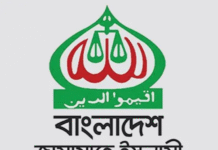Private entrepreneurs now setting up shipyards, RMG and other industries near the forest
The government is virtually helping industrialists and businesspersons to transform villages around the Sundarbans into an industrial as well as commercial area, grossly violating environmental laws.
Government agencies like the Department of Environment and the district administration, which are supposed to be guardians of the forest, have been allowing industrialists to purchase land and providing site clearance to install hazardous industries.
All these activities in the buffer zone of the Sundarbans are posing serious threats to the already vulnerable mangrove forest, which acts as a natural wall, reduces intensity of cyclones and saves life and property.
As per the Bangladesh Environment Conservation Act, 2010, no one can set up industries or construct other establishments in the buffer zone, which is an area within 10 kilometres of the forest.
The law also prohibits changing the characteristics of the land and its use pattern without permission from the authorities concerned.
Dozens of other existing conventions, policies, rules, guidelines, treaties, protocols, some of which have been formulated by the present government, restrict such activities close to the reserve forest, part of which is also a UN natural heritage site.
Once a site is declared a UN natural heritage site, the government should not conduct any activities that might jeopardise it; the government is rather obliged to protect it.
Interestingly, the government itself has started activities that would ruin the forest by constructing a foodgrain silo along with a ship dockyard for the Navy, just a stone’s throw away from the Sundarbans wildlife sanctuary.
Consequently, private investors have also started to rush there to launch projects hazardous for the forest.
The industrial area stretches from Sapmari in Rampal, where the government is constructing a coal-based power plant, to Jaymani, the last human settlement before the Sundarbans in Mongla, just a few hundred metres away from the forest.
“Industrialists have their eyes on land in nearly two dozen villages in between two government projects,” said Noor Alam, vice-chairman of Mongla upazila, when asked about it.
Some of those investors are influential politicians or their family members who easily get clearances for industry and are buying land like home yards, wetland and crop field, especially along the Pashur river.
Experts say the silo and industries will increase economic activities, leading to gatherings of new people in larger numbers.
Wheat carrying cargo ships will spill oil and the shipyards and other industries will generate harmful non-biodegradable waste which would pose threats to globally endangered Ganges river dolphin, Irrawaddy dolphin and finless porpoise.
“These industrial wastes will go downstream through the river to the Sundarbans and ruin the forest,” said Manirul H Khan, an expert on Royal Bengal Tiger.
It actually showed the Sundarbans was not safe and protected even under the government as it was allowing industries close to the forest, he added.
“If something is illegal, the Department of Environment cannot make it legal even with permission or clearance certificates,” said Syeda Rizwana Hasan, chief executive, Bangladesh Environment Lawyers Association (BELA).
On giving clearances to shipyards and other industries in the buffer zone, Taruk Kanti Shikder, director, DoE, Khulna, said he had forwarded all applications to headquarters where the final decisions were taken.
Nazmul Hossain, managing director of Sundarbans Shipyard, however said, “The director of Khulna regional office signed our site clearance certificate.”
Sun Marine Shipyard, a shipbuilding company jointly owned by Mahbubul Alam Hanif, joint general secretary of the Awami League, and his partner engineer Kazi Hasan Sharif, is heading towards its launch soon.
“We have got foreign investment and the investors want us to start the shipyard as soon as possible,” said Hanif.
“The project will generate employment opportunities for up to 5,000 people,” said Hanif, who visited the site during the last Eid.
Saif Shipyard’s signboard says it is an “environment friendly” shipbuilding yard and a venture of the expatriate brother of ruling party whip Segufta Islam, MP.
“He cancels his project,” said Segufta when contacted.
MA Salam, general secretary of Bagerhat district BNP and brother of Selim Bhuiyan, former lawmaker of BNP, has also bought land there but is yet to announce the project.
Different companies and businesses like Lithe and Fam Kom ready-made garments manufacturers, Jamuna, Amin Mohammad, Mir and Navana LP gas manufacturers, Sundarbans and Confidence shipyards are being set up in the buffer zone.
Villagers of Gabunia said many of them had to sell their home yards and cropland and shift to Dakop or rented houses in the cities.
Gaziur Rahman, deputy secretary of the food ministry, said they had not taken clearance certificate as the foodgrain silo would not cause any environmental concern.
The government imports 12 lakh to 16 lakh tonnes of wheat every year through Mongla Port which will be unloaded at the silo. The project is scheduled to be completed in December 2013, a Tk 536 crore project being implemented jointly with Japan. It will use the Navy dockyard site.
“Even cargoes are coming there now. So, it will not cause any extra harm,” said Gaziur, also the project director.
An official from the construction company at the site said the firm had been asked to complete major work as soon as possible as the prime minister was set to open it this month.
Source: The Daily Star










